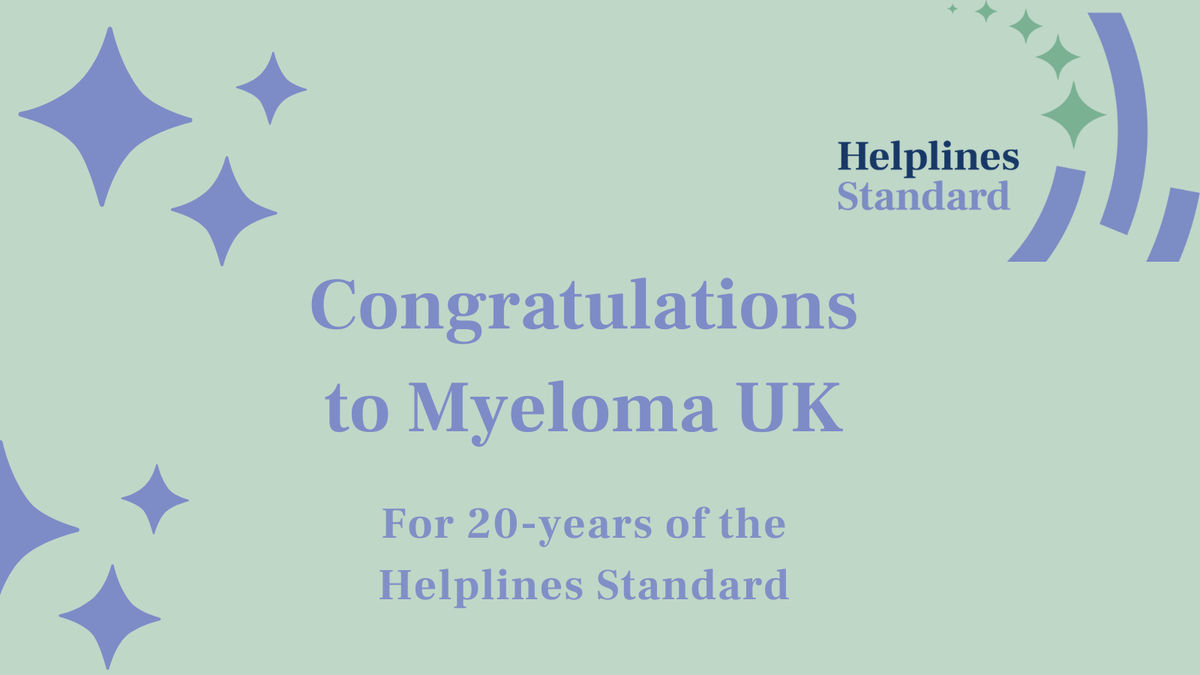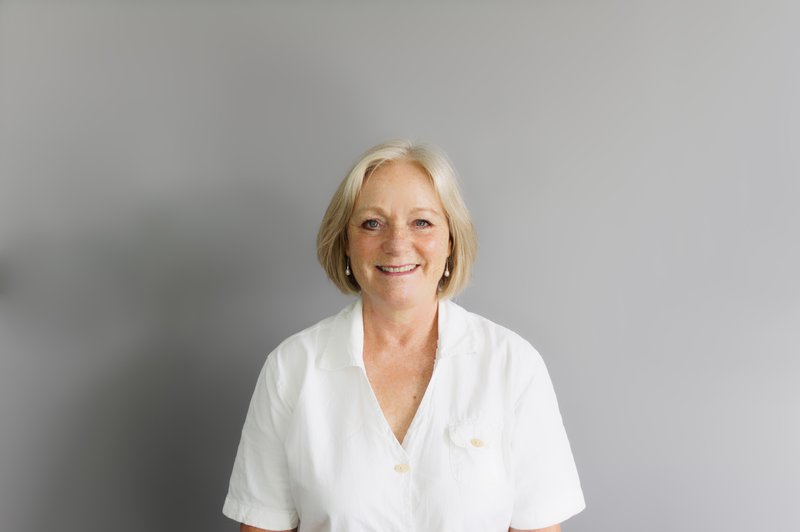Congratulations to Myeloma UK for 20 years of the Helplines Standard

Congratulations to Myeloma UK for 20 years of the Helplines Standard
Myeloma UK has achieved certification to the Helplines Standard for the twentieth year. We chat to Myeloma Information Specialist Ellen Watters, who has been with the charity for those 20 years.

Congratulations on Myeloma UK holding the Helplines Standard for 20 years. You’ve been with the organisation throughout this period, including the first assessment. Could you share what that initial experience was like and what it meant for the charity at the time?
The charity was relatively newly established but quickly gaining momentum. The helpline (the Myeloma Infoline) hadn’t been up and running long, but was already receiving an increasing number of calls from those affected by myeloma.
I joined Myeloma UK in 2003—back then, it was the International Myeloma Foundation UK. I had come straight from working the wards as a nurse in the NHS, so I still had a lot to learn about helpline work. I knew that gaining accreditation would give confidence to those using our services. The accreditation process helped us look at the way we operated in more depth. We realised very quickly that we needed to ensure that our policies and procedures were fit for purpose and that we were forward thinking.
It was a lot of work and there were times where I felt overwhelmed by the changes we needed to make, as our initial submission wasn’t quite up to standard. However, it was a worthwhile experience when we achieved the accreditation and knew that we were delivering our service to the highest standard.
Please would you give a brief overview of your helpline?
The Myeloma Infoline is for anyone affected by myeloma or a related condition. (MGUS, smouldering myeloma, AL amyloidosis, plasmacytoma and plasma cell leukaemia). We can offer information, practical advice, emotional support and a listening ear. Calls have no time limit, and people can talk for as long as they need to. Queries can also be emailed to askthenurse@myeloma.org.uk for those who prefer to type rather than talk.
How has Myeloma UK’s helpline evolved over the past two decades? Are there any key milestones or significant changes that stand out to you?
Myeloma UK has evolved into a highly respected charity. The Infoline is well used, and the myeloma community always have a voice in how we move forward. Maintaining the Helplines Standard has been a big achievement of which we are very proud. We are always looking for ways to improve and expand our services to provide holistic support tailored to an individual’s needs. For example, we now have a dedicated Peer Buddy Service and over 70 Support Groups up and down the country. The Myeloma Information Specialists answering the Infoline work very closely with our colleagues who run these associated services, and we signpost callers to them for additional support where appropriate.
What challenges did you and the team face in the early days of the helpline, and how have those challenges evolved or been addressed as the charity has grown?
The charity was relatively new, but we had very clear aims. I knew that I had joined at the beginning of something that would become an amazing resource for patients, loved ones and healthcare professionals. Over the last 20 years, I have felt very proud that I played a part in our success and in helping to make Myeloma UK the wonderful resource it is today.
There were challenges, of course. The rapid development of technology meant that it was becoming easier to find ways to access support. We had to be on top of that to make sure we weren’t left behind. We launched our Ask The Nurse email service to keep pace as more people were looking for digital support.
Coming from a clinical background meant I needed to change my ways of thinking and my practice. The transition from caring for patients face-to-face to supporting them over the phone was a challenge. I used to rely on non-verbal cues, body language, and clinical signs of deteriorating health when I worked on the wards, but none of this is obvious over a phone call.
Support was available to me from day one and I felt my voice was always heard and my concerns were listened to. I was able to research the training I needed to develop my helpline skills and ensure I was doing my job to the best of my ability. We have always had a good training budget at Myeloma UK, and I was able to attend in person – and later – online courses to keep me up to speed with a rapidly changing environment.
We now have four staff members answering the Infoline and responding to email queries. Our statistics are testament to our dedication, as we answer more than 80% of calls the first time. The feedback we receive is overwhelmingly positive and 100% of our callers would recommend the service to someone else affected by myeloma.
In your view, what are the most important factors that have contributed to Myeloma UK’s long-standing success in meeting the Helplines Standard?
Our dedication, focus and vision. We are ambitious and have clear strategic aims to work towards—we want to support people to live well with myeloma. We are highly respected amongst healthcare professionals, and they will happily signpost their patients to our services and resources. We didn’t gain this trust and respect overnight—we have had to show those working with patients that our processes are robust, that our information is evidence based and that we work closely with scientists, researchers and governing bodies. The Helplines Standard goes a long way to demonstrating our commitment to best practice.
The Helplines Standard is a significant achievement. How has maintaining this certification over the years shaped the quality of support Myeloma UK provides to patients and their families?
We are always mindful of the Helplines Standard, and it provides a helpful framework for us to work within. This has supported us to sustain our helpline offer over the last two decades, to maintain the quality of the service, and to identify areas for further improvement. We have gone from strength to strength. The Helplines Standard helps give callers the confidence that they will receive high-quality support when they contact us. We are proud to offer an accredited service and that our best practice has been recognised.
How has the role of the helpline changed in response to shifts in patient needs, advancements in treatment, and changes in the wider healthcare landscape over the last 20 years?
The Infoline team works closely with colleagues in our Research and Advocacy Team, who keep us up to date with new advances in myeloma research and treatment so that we can provide accurate and timely information to people who call the Infoline about their available options.
In 2020, we saw a huge increase in call volumes as a result of the COVID-19 pandemic, and had to adapt our ways of working to ensure we could still deliver information and support to those in need during a difficult and uncertain time.
We are also finding that due to pressures on the NHS, patients have less time available during their consultations to ask questions. We often find patients and their loved ones call us after clinic appointments for more information and to discuss any concerns.
For organisations that are considering pursuing the Helplines Standard certification, what advice would you give?
Do it. It is hard work, but it is such a worthwhile process. It will involve a lot of collaboration across your organisation, and you will need to take a deep dive into your policies and procedures to make sure they support your team to deliver the helpline service effectively. The Helplines Partnership are there to support you every step of the way. My colleagues and I made full use of the resources for working toward gaining the Helplines Standard and we felt very comfortable approaching them with any questions we had.
Looking ahead, what are your future plans for the helpline?
We are we look forward continuing our accredited best practice. We will also strive to focus more than ever on diversity and inclusion, to improve access to our information and support and broaden our reach. For instance, we are currently scoping interpretation services for our helpline, to make it accessible in other languages. We want to provide information and support everyone affected by myeloma—no matter who they are and how they are affected.
Finally, reflecting on your 20 years with Myeloma UK, what has been the most rewarding aspect of your work with the helpline, and what are you most proud of in terms of the support provided to those affected by myeloma?
When I worked on the wards, I often left my shift feeling frustrated that I was too busy to spend as much time as I would haved liked with patients and their loved ones who had received devastating news. I wanted to inform them, clarify anything they weren’t sure of, and suggest other resources for support. It was a big step for me to move away from the huge organisation that is the NHS to a small charity which only had five members of staff at the time. I didn’t think I’d stay more than a few years, but working on the Infoline is such a satisfying job as I can give people the time they need to understand and process their diagnosis.
I'm proud that I can listen to those who are at one of the most vulnerable periods in their life and help them go from the overwhelming fear of something unknown to becoming informed and more in control. I always make sure our callers know they can call back as many times as they need to.
I am also very proud that I was shortlisted for the Helpline Employee of the Year Award for my work on the Myeloma Infoline in 2019 at the Helplines Partnership annual conference and awards ceremony.